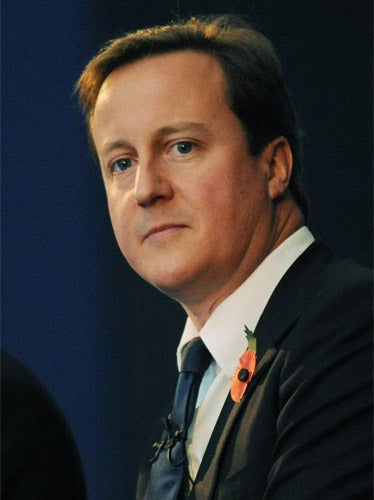Czechs leave Cameron stranded over Lisbon Treaty

Your support helps us to tell the story
From reproductive rights to climate change to Big Tech, The Independent is on the ground when the story is developing. Whether it's investigating the financials of Elon Musk's pro-Trump PAC or producing our latest documentary, 'The A Word', which shines a light on the American women fighting for reproductive rights, we know how important it is to parse out the facts from the messaging.
At such a critical moment in US history, we need reporters on the ground. Your donation allows us to keep sending journalists to speak to both sides of the story.
The Independent is trusted by Americans across the entire political spectrum. And unlike many other quality news outlets, we choose not to lock Americans out of our reporting and analysis with paywalls. We believe quality journalism should be available to everyone, paid for by those who can afford it.
Your support makes all the difference.Europe's leaders celebrated last night after the Lisbon treaty was finally ratified after two years of delay, paving the way to the creation of a new-look European Union.
The final hurdle to its endorsement was swept away when the Eurosceptic Czech President, Vaclav Klaus, became the last of the 27 EU leaders to sign the document.
But the move forced the Tory leadership into a damaging policy U-turn as they abandoned the party's long-held promise to hold a referendum on Lisbon. William Hague, the shadow Foreign Secretary, conceded last night that holding a vote on Lisbon was "no longer possible".
David Cameron will now face charges of betrayal from Eurosceptics on the party's backbenches after he made a "cast-iron guarantee" to the public in 2007 that he would hold a referendum on the treaty.
He is to outline his party's new approach to the Europe today, when he is expected to back renegotiation of some of the Lisbon treaty's measures and guarantee a referendum on any similar document drawn up in the future.
"Now that the treaty is going to become European law and is going to enter into force, that means a referendum can no longer prevent the creation of the president of the European Council and the loss of British national vetoes," Mr Hague said. "These things will already have happened and a referendum cannot unwind them or prevent them.
"We were very clear that our promise applied to those circumstances. After today, those things will come into force and a referendum can't change them."
The treaty is designed to streamline EU decision-making and improve scrutiny of its policies. President Klaus added his name to the treaty, turning it into European law, after the Czech Constitutional Court threw out a claim that the agreement was unconstitutional.
Now the EU will arrange an emergency summit within two weeks to choose the holders of the posts created by the treaty, with a view to the jobs coming into force on 1 January. Most attention will focus on the selection of the President of the European Council and the EU High Representative, effectively its foreign minister.
Herman Van Rompuy, the Belgian Prime Minister, and Jan Peter Balkenende, his Dutch counterpart, are viewed as current front-runners for the presidency, with Tony Blair's allies insisting he is still in the running for the job. Mr Blair's supporters maintain they are not deterred by the doubts cast over his candidacy by France, Germany and smaller EU member states.
Were the former prime minister to drop out of the race, attention would focus on Foreign Secretary David Miliband's credentials for the post of High Representative. He has said he is "not available" and "not a candidate" for the job, but failed last week to rule himself out under all circumstances.
Join our commenting forum
Join thought-provoking conversations, follow other Independent readers and see their replies
Comments